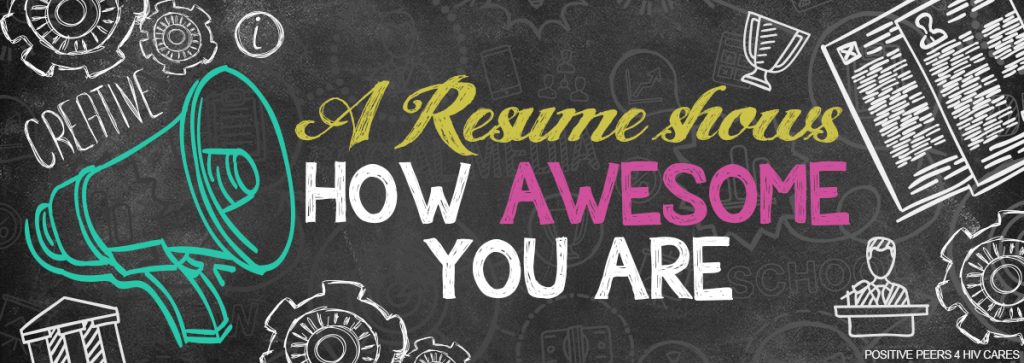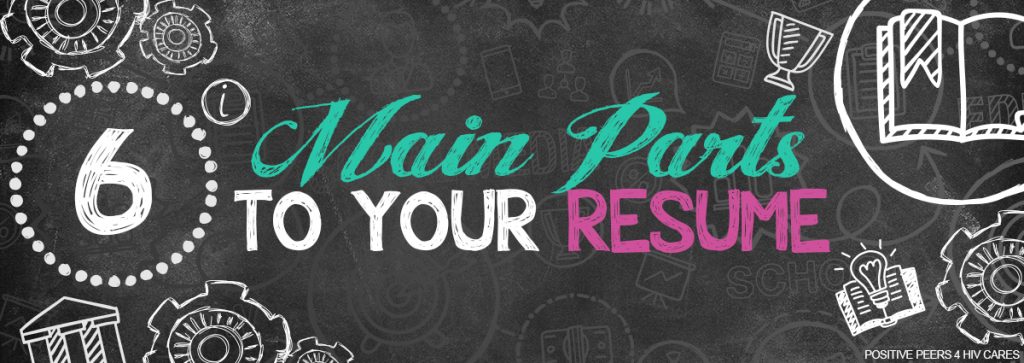
By: Jennifer McMillen Smith, LISW-S, HIV Social Worker at MetroHealth Medical Center and medically reviewed by Ann K. Avery, MD, Infectious Disease Physician at MetroHealth Medical Center
If you’re looking for a job, it’s a good idea to summarize all your qualifications on one sheet of paper that has your name, address, phone number, previous jobs, education, training, and skills.
We call that sheet a “résumé” (pronounced “rez-uh-may”), which means “summary” in French. (Most of the time, though, you will find it written without the accents — resume — which seems to be acceptable these days.) Why not just call it a summary? Look, we gotta call it something, and since everybody providing jobs uses the French word for your job history, let’s stick with it.
So, how does a resume work?
Why not just fill out an application and leave it at that?
Well, a job application doesn’t tell your whole story — it just tells specific things your future employer wants to know: where you live, your Social Security and phone numbers, who you’ve worked for in the past, and other basic stuff like that.
An application doesn’t get into what makes you so awesome.
That’s the resume’s job.
What do I have to do to write a resume?
Start by gathering all the main biographical facts about your working life:
- Home address
- Phone number
- Social Security number
- Previous jobs, including the dates, addresses, and phone numbers (volunteer gigs count as jobs)
- Schools you’ve attended
- Training you’ve received
- Machinery, equipment, or computer programs can you operate
- Languages you speak
The next part is trickier — creating a list of all the reasons why somebody should want to hire you.
This is tough because when you want a job, all you can think about is what you want. Your resume needs to turn this around: Focus on what your future boss wants.
Employers want people who show up on time, who dive into their work with enthusiasm (or who at the very least don’t whine or complain about it). They want people who are flexible, willing to learn, and able to get along well with their co-workers.
So, we suggest writing down things like:
- What you did really well in previous jobs.
- The qualities that make you a great employee — honesty, work ethic, diplomacy, street smarts, kindness, and all-around people skills.
- Your professional ambitions.
Basically, it comes down to this: What have you got to give? And why should they hire you instead of somebody else?
Come join our private, stigma-free, supportive community.
Health management tools with medication & appointment reminders.
Social networking in a community conversation & private chats.
How do I start writing my resume?
Resumes are simple, but sometimes getting started isn’t. Unsure where to begin? You could ask around and see what others’ look like. If they used a paid service, you might ask about that too.
Next, find a computer where you can start inputting all your information. You’ll need a basic word processing program and the ability to save your document and print it out. If you can’t find a friend or family member to help you out, visit your local library and use one of their computers.
Find a librarian and explain that you need help creating a resume. They get a lot of these requests and should be able to help you out. It’s a good idea to create a document and save it to a USB flash drive or your cloud (iCloud for iPhone users; Google Drive for you Android users), and print it. You’ll also want to make a PDF, which is a digital copy of the resume that you can email to people.
We suggest you keep a digital copy in your files or emailed to yourself so you can refer back to it in the future to update your achievements and use for a future job search.
What format should I use?
Resumes usually have four to six main parts:
- Introduction: A quick overview of who you are, your employment background, and what kind of work you’re looking for.
- Work history: All the jobs you’ve held, starting with the most recent and working backward.
- Education: The schools you’ve attended, plus any training courses you’ve taken outside of school.
- Skills: Specific jobs you can do, plus all the qualities we mentioned above that make you a great employee. (For example, instead of saying “I am a dedicated worker,” say, “Dedicated worker seeking a position in retail.”) Speak a second language? This is a great place to mention it.
- Hobbies and interests (optional): What you’re into tells an employer a lot about the kind of person you are. Leave this off if you think your free-time fun is none of your boss’s business, but keep it in if it makes you look like a better candidate for the job.
- References (optional): People who know you and who will give you a good recommendation for a job. (Some people leave their references off the resume and write “References available by request.”)
The first thing an employer looks for is your work history. If you have big gaps in your work history — or no work history at all — put your skills above your work history.
Before you give your resume to any potential employers, make sure it has been proofread for spelling errors, factual mistakes, and general goof-ups. You want it to be crystal clean when you give it to anybody offering a job.

Putting it all together
Before you plunge into creating your resume, we recommend spending some time on the Internet looking at samples and reading advice on the finer points.
A resume is just a snapshot of the prize that is you. It’s good to have, and should be done well, but it won’t determine the course of your life or the success of your career.
Only you can do that.
Related Blogs:






